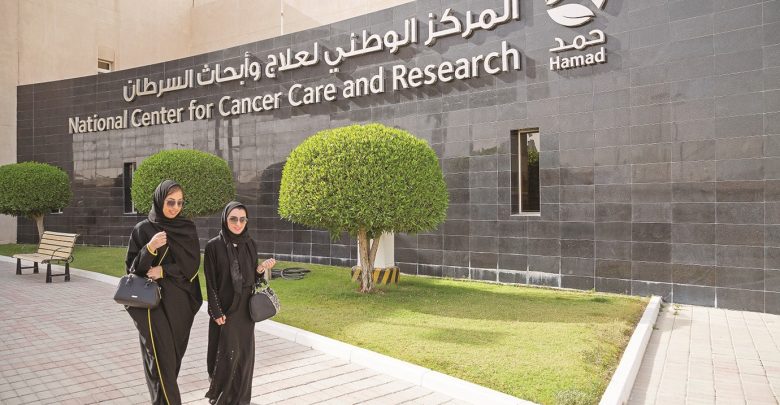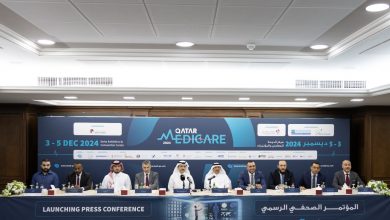
Over 2,500 assessed at HMC’s high-risk genetic oncology screening clinic
«حمد الطبية» تستقبل 2500 حالة في عيادة الكشف عن المورثات السرطانية
Doha: Qatar’s first high-risk genetic oncology screening clinic, located at the National Center for Cancer Care and Research (NCCCR) – a member of Hamad Medical Corporation (HMC) – has seen an increase in the number of individuals visiting the clinic since it first opened in 2013.
The clinic, which is part of NCCCR’s Cancer Genetics and Genomics Medicine program, provides genetic counselling and testing services to individuals who are concerned about their cancer risk because of a personal and/or family history.
The programme is the first of its kind in the region and was established to care for those who have a higher risk of developing cancer during their lifetime due to hereditary factors. The programme is supported by a multidisciplinary team of oncology, genetic counselling, and molecular genetics laboratory specialists, as well as a number of international genetics laboratories.
Since it was established in 2013, over 2,500 patients have been assessed at the clinic, with around 60 per cent being diagnosed with cancer. Dr Salha Bujassoum, Senior Consultant at the NCCCR and Director of the Hereditary Cancer and High-Risk Screening Program said the multidisciplinary clinic aims to identify patients at risk of developing the disease due to young-onset diagnosis, a strong family history, or a positive genetic test result.
“Advances in the field of genomics and precision medicine means that the Cancer Genetics and Genomics Medicine programme is becoming a core part of the care offered to patients and their families in Qatar. Ours is the first programme of its kind in the Middle East and has not only helped to establish HMC as a leader and innovator inpatient and family-centred care but also as a model for enhanced patient care that other countries in the Middle East can follow,” said Dr Bujassoum.
“In addition to providing direct care, by developing clinical practice guidelines and educational sessions for clinicians and healthcare workers about hereditary cancers, the program also includes an educational element. It features a number of educational meetings and research projects related to the many diverse aspects of cancer,” added Dr Bujassoum.
Dr Reem Alsulaiman, Board Certified Genetic Councilor explained that while the cancer genetics program primarily focuses on patients at risk of developing hereditary breast and ovarian cancers, it has been expanded in recent years. She says the service now provides care to patients with a higher than normal risk of developing other types of cancers, including hereditary aetiology, such as gastrointestinal, endocrine, gynaecological, dermatological, urological, haematological, as well as a number of rare cancers.
Late last year, the initiative gained international attention when a scientific research paper highlighting Qatar’s establishment of the program was published in the prestigious academic publication – the Molecular Genetics and Genomics Medicine Journal. The article was peer-reviewed by an international editorial board of experts in diverse areas of human and medical genetics and genomics.
شهدت عيادة الكشف عن المورثات السرطانية عالية المخاطر في المركز الوطني لعلاج وأبحاث السرطان -التابع لمؤسسة حمد الطبية- تزايداً في أعداد المراجعين لها منذ افتتاحها في عام 2013. وتقدّم هذه العيادة، التي تعتبر جزءاً من برنامج طب الجينوميات (المورثات) البشرية في المركز الوطني لعلاج وأبحاث السرطان، خدمات الاستشارات والفحوصات الوراثية للأفراد الذين يتخوّفون من خطر الإصابة بالسرطان؛ بسبب التاريخ العائلي الذي يبين وقوع الإصابات بالأمراض السرطانية لدى أفراد العائلة.
يُعتبر هذا البرنامج الأول من نوعه في المنطقة؛ حيث تمّ تأسيسه بهدف تقديم الرعاية للأشخاص الذين تكون مخاطر الإصابة بالأمراض السرطانية لأسباب وراثية لديهم عالية، ويشرف على تطبيق وتشغيل هذا البرنامج فريق متعدد التخصصات الطبية في مجالات الأورام السرطانية، والاستشارات الوراثية، واختصاصيي المختبرات الجينية الجزيئية، بالإضافة إلى شراكات مع عدد من المختبرات الدولية المتخصصة في الأبحاث والتحاليل الوراثية.
ومنذ افتتاحها في عام 2013، قام العاملون في عيادة الكشف عن المورثات السرطانية عالية المخاطر بفحص وتقييم ما يزيد على 2500 حالة للكشف عن الأمراض السرطانية، وقد تمّ تشخيص أمراض سرطانية لدى حوالي 60 % من مجموع هذه الحالات.
وقالت الدكتورة صالحة بوجسوم، استشاري أول أورام سرطانية ورئيس برنامج الكشف عن الأمراض السرطانية الوراثية عالية المخاطر في المركز الوطني لعلاج وأبحاث السرطان: «تهدف هذه العيادة إلى تحديد المرضى المعرّضين للإصابة بالأمراض السرطانية نتيجة للتاريخ المرضي العائلي لديهم، وغير ذلك من الأسباب الكامنة.
ونظراً للتقدّم الذي تم إحرازه في مجال طب الجينوميات (المورثات) البشرية والمستوى العالي من الدقّة الذي تحقق في هذا الميدان، أصبح برنامج طب الجينوميات (المورثات) البشرية جزءاً محورياً من الخدمات المقدّمة للمرضى وأفراد أسرهم في دولة قطر».
وأضافت الدكتورة صالحة بوجسوم: «بالإضافة إلى تقديم الرعاية الصحية المباشرة للمرضى، يوفّر البرنامج للأطباء والكوادر الطبية الأخرى الإرشادات التوجيهية والنشاطات التعليمية والتدريبية حول الأمراض السرطانية الناجمة عن أسباب وراثية، ومن هذه النشاطات الاجتماعات التعليمية الدورية والمشاريع البحثية التي تتناول مختلف الجزانب المرتبطة بالأمراض السرطانية».
من جانبها، أوضحت الدكتورة ريم السليمان -خبيرة العلوم الوراثية- أن برنامج طب الجينوميات (المورثات) البشرية كان يركّز في بداياته على مريضات سرطان الثدي وسرطان المبيض، وأنه قد تمّ توسيع نطاق خدمات هذا البرنامج فيما بعد ليشمل المرضى الذين تكون لديهم مخاطر عالية للإصابة بأنواع أخرى من السرطان، بما في ذلك تلك الناجمة عن أسباب وراثية مثل الأمراض السرطانية التي تصيب الجهاز الهضمي، والغدد الصمّاء، والجهاز التناسلي لدى النساء، والمسالك البولية، والدورة الدموية، بالإضافة إلى عدد من الأمراض السرطانية النادرة.;



